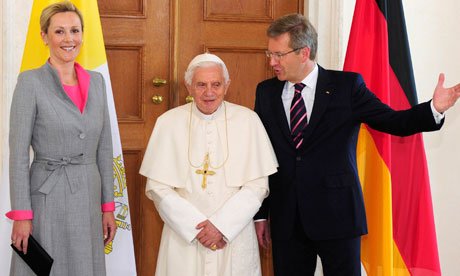
Pope Benedict XVI has begun his first official visit to Germany, his native country.
After arriving in Berlin, Pope Benedict XVI said he had come to the country to talk about Christianity, not politics.
The Pope visit to Germany may be one of his most difficult to date, with strong protests expected against his teachings.
Pope Benedict XVI, 84, is to address the German parliament and say Mass in Berlin’s Olympic Stadium during the four-day visit.
The pontiff will travel widely across Germany, where there are officially 25 million Catholics – one third of the population.
The Pope has visited Germany unofficially several times since assuming the Church’s highest office, travelling to Catholic strongholds in the Rhineland and his native Bavaria.
However, the tour will take Benedict XVI into historically Protestant regions and parts of the atheistic old East Germany.
Chancellor Angela Merkel, daughter of a Lutheran pastor who grew up in East Germany, said Christian unity would be a focus of the Pope’s visit.
Tomorrow, Benedict XVI will meet members of Germany’s Lutheran Church in the monastery where Luther studied as a monk in Erfurt in the early 16th Century, before breaking with Rome and launching the Protestant Reformation.
Pope Benedict has been greeted at Berlin’s Tegel airport by an artillery salute and a guard of honour and he was welcomed by Chancellor Angela Merkel and President Christian Wulff.

Visiting President Christian Wulff’s residence in Berlin, Benedict XVI said:
“I am not here first and foremost… to follow particular political, or economic, aims but to meet the people and to speak to them about God.”
The Pope visit has attracted opposition from various groups. Protesters have taken issue with the Catholic stance on homosexuality and contraception, and some members of German Parliament – possibly as many as 100, or almost one in seven – plan to boycott his speech to the Bundestag, on Thursday.
It is believed that at least 20,000 demonstrators, including gay people, feminists, atheists, abuse survivors and other opponents of the Pope, will gather in Berlin.
German Interior Minister Hans-Peter Friedrich, who is a Protestant, criticized the planned boycott, accusing members of Bundestag of “arrogance, narrow-mindedness and provincialism”.
Berlin’s openly gay mayor, Klaus Wowereit, said he welcomed the Pope’s visit and would meet him personally, but he also expressed understanding for the protesters.
Both Mayor Klaus Wowereit and President Christian Wulff, who is divorced and remarried, are Catholics who in the eyes of the Church lead sinful lifestyles.
Speaking to reporters on his plane from Rome, Pope Benedict XVI said he could understand those leaving the Church due to the sexual abuse scandals of recent years.
One of the highlights of Pope visit to Germany is a Mass to be held on Thursday evening at the Olympic Stadium.
The Olympic Stadium, where Hitler hosted the 1936 games, is now a popular sporting and entertainment venue, and some 70,000 people are expected to attend the Mass.
The tour includes also a meeting with former Chancellor Helmut Kohl and a visit to the strongly Catholic city of Freiburg in the south-west.
According to AFP news agency, a record of 181,000 German Catholics officially quit the Church last year, a total for the first time higher than that for Protestants leaving their churches.
The Pope also told reporters in the plane he had nothing against the planned demonstrations against his visit, as long as they were civil.
“I can understand that in the face of such reports [about sexual abuse], people, especially those close to victims, would say <<this isn’t my Church anymore>>.”
“The Church is a net of the Lord that pulls in good fish and bad fish. We have to learn to live with the scandals and work against the scandals from inside the great net of the Church.”
Groups of Catholics who are demanding reform of the Church will also use the visit to express their views.
Sigrid Grabmeier, a spokeswoman of Catholic reform group Wir Sind Kirche (We are Church), said she had mixed feelings about the Pope’s visit.
“I do not really know what he wants to tell us about really important things like justice and the world, or rich and poor people or something.”
Sigrid Grabmeiercalled for a return to Christian basics, saying: “Jesus, he did not found a religion and he did not tell us how we should believe, but how we live.”